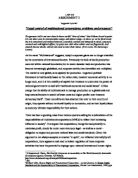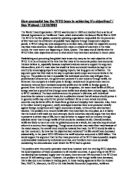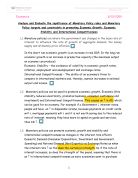"Imperial reform in the 19th century was primarily motivated by economic factors
"Imperial reform in the 19th century was primarily motivated by economic factors." How accurate a description is this, with reference to the changes made in the administration of the British Empire, 1815 to 1870? The period 1815 to 1870 was characterized by radical change in the character of the British Empire, to the extent that, by the end of the period, the empire consisted of two distinct parts: one made up of 'dependent' colonies, experiencing direct formal rule; and the other made up of self-governing 'settlement' colonies. This development occurred as a result of a series of social, political and economic reforms. In order to judge whether economic factors dominated imperial reform during this period, an assessment of the causes and nature of reforms is necessary. However, while imperial reform was multicausal, great weight can be given to the argument that underlying economic factors which stimulated initial social reform and change, which in turn propagated political reform. One of the earliest reforms was the dismantling of the slave system, initiated by Britain in 1807 through the end to British involvement in the transatlantic slave trade, and again in 1834 through the abolition of colonial slavery. The abolition can be seen as a result of a combination of economic, social and political factors. The economic decline of the British Caribbean and other regions,
"Globalisation Is A Force For Good, Any Faults Lie With the Actions Of The Global North", Discuss.
"Globalisation Is A Force For Good, Any Faults Lie With the Actions Of The Global North", Discuss. The question is globalisation a force for good or bad has been looked at for a long period of time, focusing on the international economic system. Globalisation is an area of politics that has been very difficult to define as the term means many different things to many different people for example the term would be defined differently between activists against globalisation and people who are very much for globalisation. In this essay I will be looking at the pros and cons or globalisation, and will also be looking at the influence and the problems of major NGO's A definition of globalisation from English theorist Anthony Giddons is: "Globalisation can thus be defined as the intensification of worldwide social relations, which link distant localities in such a way that local events are shaped by events occurring many miles away and vice versa"1 An academic from Holland called Rudd Lubbers defines globalisation as: "a process in which geographic distance becomes a factor of diminishing importance in the establishment and maintenance of cross border economic, political and socio-cultural relations"2 For this essay globalisation will be the increased mobility of goods, services, labour, technology and capital around the globe through capitalism. The pro-globalisation
"Legal control of multinational corporations: problems and prospects".
LAW 410 ASSIGNMENT 2 Suggested Topic #25 "Legal control of multinational corporations: problems and prospects" The greatest evil is not now done in those sordid "dens of crime" that Dickens loved to paint. It is not done even in concentration camps and labour camps. In those we see its final result. But it is conceived and ordered (moved, seconded, carried and minuted) in clean, carpeted, warmed and well-lighted offices, by quiet men with white collars and cut fingernails, and smooth-shaven cheeks who do not need to raise their voices. (C.S. Lewis, The Screwtape Letters) As the name "Multinational" suggests, today's corporate giants are no longer shackled by the constraints of international borders. Previously the bulk of world production occurred within national boundaries, but in recent decades trade and production has become increasingly globalised, and corporate activity has diversified and multiplied. The market is now global, as is capacity for production. Legal and political framework is traditionally based on the nation state, however economic activity is no longer such, and it is this mobility of capital that threatens to undermine the power of national governments to deal with traditional economic and social issues1. Critics charge that the ability of multinationals to manage production on a global scale and leap national borders in search of lower costs and
"Liverpool's slave trade was the centre of a global commerce and an important factor in British economic growth." To what extent would you agree with this opinion?
Part B -"Liverpool's slave trade was the centre of a global commerce and an important factor in British economic growth." To what extent would you agree with this opinion? This essay will attempt to answer the question by approaching it in three stages. Firstly it will assess the importance of Britain's slave trade in the context of global commerce, especially during the 18th century. Secondly it will attempt to show the degree of significance - and the reason - for Liverpool's involvement as a British port, and thirdly, to find out whether or not this had a bearing on Britain's economy in general. In other words, the essay will attempt to ascertain whether Britain's slave trade "was the centre of a global commerce", and whether Liverpool was, in turn, the central city for that particular trade. From around 1600, Britain had colonised or conquered a network of territories all over the world including parts of the Americas - According to Professor Kenneth Morgan, "By 1797-8, North America and the West Indies received 57 per cent of British exports, and supplied 32 per cent of imports"1. The 18th century saw Britain rise to an undisputed dominant position among her rival European powers. Trade with these overseas colonies was a driving force behind the Industrial Revolution, especially throughout the 19th Century, in providing sources of raw materials and markets for finished
"Machine breaking and strike action were characteristic of unruly and undisciplined Labourers".
"Machine breaking and strike action were characteristic of unruly and undisciplined Labourers" Violence, protest and machine breaking were all characteristic of the late 18th and early 19th century. Employers seeking to make more off less, drove down workers wages with the more widespread use of machines, such as the gig mill. After failed attempts at lawfully seeking and upholding statutes which protected the outworking system from newly mechanised 'factory' industry, where products were of a lesser quality, the workers were left with little choice but to resist with violence. This happened at a time when bad harvests had caused an acute increase in food prices, and foreign wars had damaged foreign trade. Not only did they resent this tide of cheaper, faster and less-skilled change, but also to the greater shift in change to 'Laissez-faire' capitalism which left them completely unprotected. Although the assumption that the act of deliberate wrecking of industrial machines was born with the Luddites, this is not the case, moreover the assumption that these violent outbursts were committed by the un-skilled lower class 'mob' are also untrue. This Luddite myth is one that needs addressing, as it has fallen into lore. However it can not be ignored that the violence did sometimes escalate out of control (ending in death) yet this serves to
"Discuss the Effectiveness of Supply Side Policies in Improving UK Economic Performance"
Kanak Shah Economics AS/b David Conquest "Discuss the Effectiveness of Supply Side Policies in Improving UK Economic Performance" Supply side policies are those designed to increase an economy's long-term growth and so increase aggregate supple or production. In terms of a graphical analysis, if supply side policies work, the long run AS (aggregate supply) curve would shift to the right. A number of various policies have been implemented to increase aggregate demand (AD). The first is deregulation. This involves removing laws and regulations which restrict competition. With deregulation, more firms will compete in the industry and the total supply of the good or the service will increase. A good example to look at is airline deregulation. All Europe flight routes were regulated by governments. There was not very much competition. With the introduction of deregulation, any airline company can fly on any routes that they bid for e.g. EasyJet and Buzz (all low cost airlines). This increases passenger numbers and there is more aggregate supply in the industry. There are a couple of advantages of deregulation. Less regulation means that fewer regulators need to be employed by the government or local councils. Also less regulation should encourage more competition. However, many rules affecting business were to stop exploitation: is this acceptable nowadays? Another
Examine the roles and place of trade blocs in the global economy.
Economics - Mr. Russell " Free Trade and comparative (economic) advantage are the main justification for international trade." i) Examine the roles and place of trade blocs in the global economy. A trade bloc or free trade area is a group of countries between which there is free trade in goods and services but which allows member countries to set their own level of tariffs against non-member countries. The European Union is the largest multi-national free trade bloc, followed by NAFTA (North American Free Trade Agreement), MERCOSUR and AFTA (ASEAN free trade area). NAFTA is a free trade agreement involving Canada, Mexico and the USA. Of the free trade unions NAFTA is the most limited, as it is restricted to eliminating tariffs, quotas and other trade impediments amongst the 3 countries involved. There is no common customs or tariff agreement for imported goods and services or any free movement of citizens allowed. It is a very powerful trade bloc, because of the economic and political power of the USA. NAFTA is in the process of becoming a free trade zone, as it has not reached this goal completely, since there are still a number of industries, which receive protection, such as citrus, lumber and Mexican petroleum. MERCOSUR is a trade agreement has members in the South America and within ten years will represent possibly almost all the countries on the continent. Not
Globalization is undoubtedly not a single phenomenon.
Globalization is undoubtedly not a single phenomenon. The concept of globalization has become a catch-all concept to describe an array of developments and forces changing the social and economic structures of the world. Thomas L. Friedman, author of The Lexus and the Olive Tree, describes globalization as "a movement that enables individuals, corporations, and countries to reach around the globe farther, faster, deeper, and cheaper than ever before" (Oneworld.org.) Globalization is based on the concept that the globe is a single unit for decision-making. It is the expansion of free market capitalism, or simply put, is the means of free movement of goods, services and capital throughout the world. In addition, with current technological advancements, globalization has become more accessible. Now, businesses can manage overseas operations with more control through the use of the Internet and improved telecommunications. Advances in communication and transportation technology, combined with free-market ideology, have given goods, services, and capital extraordinary mobility. Northern countries want to open world markets to their goods and take advantage of abundant, cheap labor in the South, policies often supported by Southern elites. They use international financial institutions and regional trade agreements to compel poor countries to integrate by reducing tariffs,
What's the definition of Globalisation?
Contemporary Marketing Issues Globalisation From: Petra Belo To: Indra Athi Course: BA Marketing Management What's the definition of Globalisation? Globalisation is a term that is frequently used but hardly ever defined. It refers to the rapid increase in the share of economic activity taking place across national boundaries. This goes beyond the international trade in goods and includes the way those goods are produced, the delivery and sale of services, and the movement of capital. Globalisation it is also an idea of our time, highly contested and widely accepted at the same time. It relates to the economy, politics, culture, society, and generally, with everything we deal with in our everyday lives. Can be thought of as a process, in which economic markets, technologies, and communications gradually can to exhibit more "global" characteristics, and less "national" or "local" ones. In this scene, it is the millions of daily decisions concerning technology choices, market structure, and communication patterns that "drive" the globalisation process. In altering these patterns, globalisation will generate a variety of consequences, both for the world as a whole, and for individual countries. These consequences will be both economic and environmental in nature. Introduction Held et al (1999) separate the theorists of globalisation into three different schools the
Flower Industry in Netherlands
Flower Industry in Netherlands Haw Hsin Yang Rutgers University-Camden A) International Trade * Balance of payments-analyses and implications Netherlanders create a total GDP of €453 billion in 2003 which equals €27,900 per capita. Export and import of goods as % of GDP respectively reached 58% and 68%, and she is the sixth largest exporter and investor in world. A sizable current account surplus is produced by food processing, chemicals, petroleum refining, and electrical machinery. The country continues to be one of the leading European countries for attracting foreign direct investment. Though economic growth slowed considerably in 2001-03, as partly the global economic slowdown, for the four years before recession, annual growth of GDP averaged nearly 4%, which exceeded the EU average. Year 998 999 2000 2001 2002 Trade balance Amount Million $ 20430 6034 7519 20913 25754 Current account balance Amount Million $ 3031 2996 4561 8144 9866 Capital and Financial account balance Amount Million $ -15370 -17607 -4341 -8495 -9999 Overall balance Amount Million $ -2339 -4611 220 -351 -133 Source: IMF Financial Statistics Year Book 2003 * Trading relationships The Netherlands has been a leading trading nation for many centuries. Her prosperous and open economy depends heavily on foreign trade. In 1602, the very first international






















